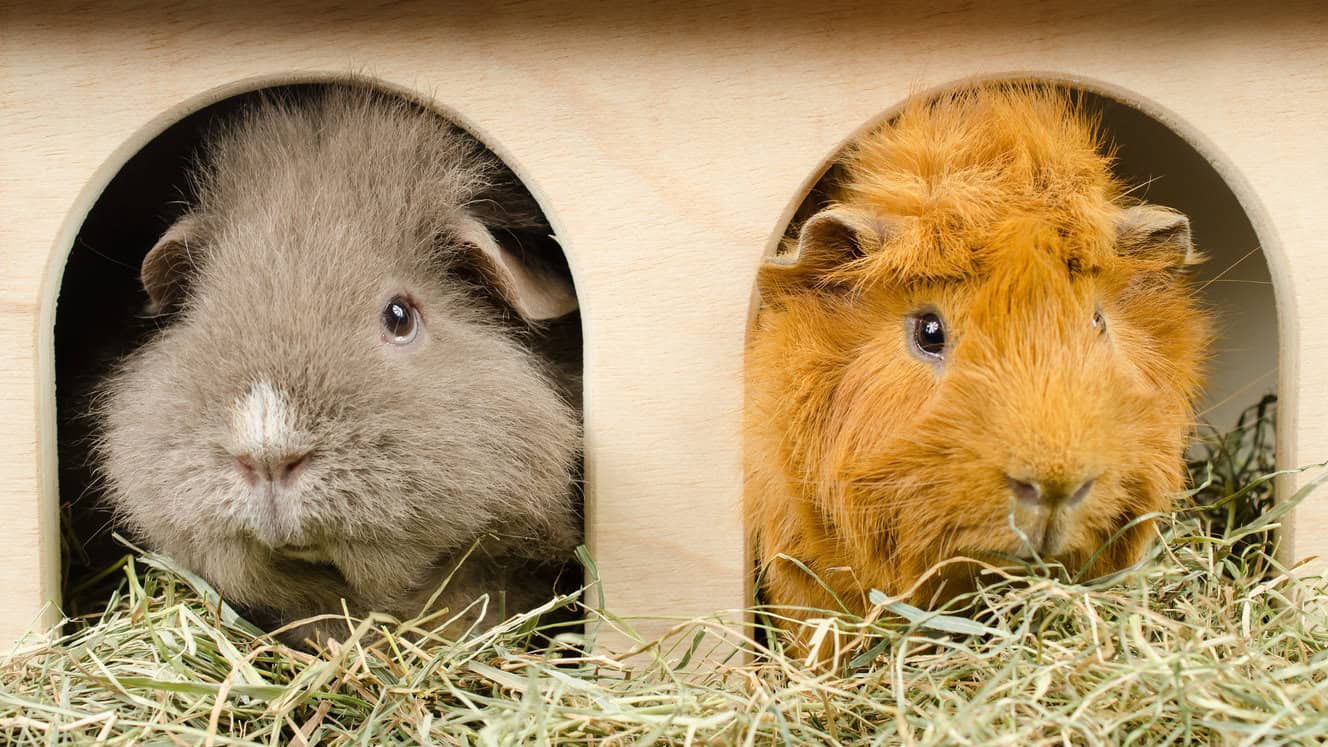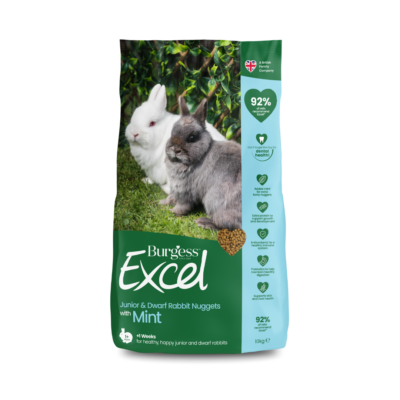
Each spring, the natural world awakens from its winter stasis. Green leaves unfurl from bare branches, early blooms peek out of the cold earth and the dawn skies are filled with the songs of birds, busily preparing for the nesting season. Insect populations begin to stir too – and some of these can cause problems for our small pets.
While insects are a vital part of the ecosystem – pollinating plants, breaking down waste and recycling nutrients back into the soil, as well as being an important food source for animals such as birds, bats and hedgehogs – some can be a bit of a nuisance. If you have small pets, then fleas, mites, flies, ticks and mosquitoes can be irritating and unwelcome pests.
SPRING DAYS IN THE SUNSHINE Just like us, our rabbits and guinea pigs are eager for some fresh spring air. However, if you’ve decided it’s time to let your small pets enjoy some outdoor time, there are precautions you need to take so it’s not a shock to their system.
A magnet for all manner of pests
Keeping your small pets’ home clean and dry is super important. Dirty, damp bedding not only creates an unhealthy environment for small furries, but it will also become a magnet for all manner of pests seeking somewhere warm and moist to bed down.
Mould and fungus can also start to form, releasing thousands of microscopic spores that can cause respiratory infections and allergic reactions.
This deadly combination can cause all sorts of nasty problems for small pets. For example:
- Guinea pigs have very sensitive skin and are susceptible to a number of skin complaints. Damp and dirty bedding creates the ideal environment for bacteria, fungi and other harmful things to thrive.
- Flystrike is a painful, sometimes fatal, condition that can affect outdoor pets such as rabbits and guinea pigs. It’s caused by flies laying eggs that hatch into maggots and eat their host’s flesh who are attracted by dirty bedding.
- Pododermatitis is a condition where pressure sores form on the bottom of a rabbit’s feet and can also affect guinea pigs too. The best way to prevent it is to avoid hard or wire flooring and remove soiled and wet bedding every day.
WHAT’S THE BEST BEDDING FOR SMALL PETS? Whichever small pets you have, each has a different requirement when it comes to creating a cosy, safe snoozing space.
Get into a regular clean for hygiene routine
The best way to stop an unpleasant parasite invasion and prevent mould and fungus from taking hold is to adopt a regular clean for hygiene routine. This means not only cleaning away visible dirt and droppings, but also eliminating microscopic organisms such as mould and fungus spores and bad bacteria that could cause nasty illnesses.
A good cleaning regime also benefits your small pets’ wellbeing and happiness. “Keeping your small furries’ cage or hutch clean is as much about keeping them happy as it is about hygiene,” advises The Vet Whetstone. “Any animal that grooms itself that much is going to want a clean home too! It’s time to get used to a routine of daily, weekly, and monthly cleaning to give them the best care. Remember, cleanliness and freshness are key.”
- Every day, do a quick spot check, throwing away wet or dirty materials, including bedding and uneaten food as this will quickly become rotten and mouldy. Remember to keep back a little of the old hay so that the place still smells like home to your pets. Litter training your rabbits can help make cleaning up a whole lot easier!
- If your pets’ water bowl or bottle is turning green with algae, then it is importantly you thoroughly scrub it clean and disinfect it with hot water and vinegar. If you can’t remove the algae, then throw the bottle or bowl away and buy a new one. Always supply fresh water morning and evening.
- Weekly, remove and replace all their litter and bedding materials.
- Once a month, give your small pets’ enclosure a really thorough, deep clean. Wait until your pets are their run or place them in a pet carrier with some of their bedding. Grab the underlying newspaper and roll it up with the soiled bedding in it. Use a dustpan and brush to sweep the remaining bits out, sweeping all corners, the sides and the door. Wipe down the whole of your pets’ accommodation, including wire doors, runs and enrichment resources, using pet-friendly, non-toxic cleaning products. Replace with clean, fresh bedding, feeding hay, and water. Make sure housing is dry before returning your pets.
- Groom your guinea pigs or rabbits regularly to keep them in good condition. Long haired breeds will need grooming daily. Regular grooming will also help you look for any lumps, bumps or bites that suggest your pets are being bothered by parasites so you can deal with it promptly.
WHAT’S IN SEASON? HOW TO CHOOSE SAFE FRESH FOOD FOR YOUR SMALL PETS Select safe fruits, vegetables and leafy greens for your small pets to nibble on – you could even forage for some tasty titbits or grow your own!
MORE TOP TIPS TO HELP PROTECT THE HEALTH OF YOUR SMALL FURRY FRIENDS
- It’s essential to get your rabbits vaccinated regularly. Vaccinations protect them against myxomatosis and Rabbit (Viral) Haemorrhagic Disease (R(V)HD) and R(V)HD2. Your vet will advise how often your rabbits should be vaccinated.
- Only use species-appropriate medicines to treat external or internal parasites (such as mites, ticks and worms) as advised by your vet. Medicines intended for other animals can be very dangerous to rabbits and guinea pigs.
- Check the fur and skin around your pets’ rear ends regularly for signs of flystrike – daily when the weather gets warmer. Speak to your vet about specific preventative measures such as Rearguard – a liquid that is applied by sponge and helps prevents flystrike in rabbits for up to 10 weeks, or Fly Strike Protector for guinea pigs.
- Always feed only the best quality rabbit nuggets or guinea pig pellets and high-quality feeding hay to support a healthy digestion, along with teeth, skin and coat health. This will go a long way to keeping your small pets in the best of health and help to keep parasites away.
WHAT PUTS YOUR SMALL PETS IN A GOOD MOOD? Along with socialising with their same species companion and interacting with their favourite human, our survey reveals the best thing you can to do to give your small furries a happiness boost…
LOVE YOUR BUNS? Did you know that in 2006, Burgess Pet Care launched the first Rabbit Awareness Week (RAW)? Collaborating with leading animal charities and vet bodies, this annual campaign serves to educate rabbit owners about the best ways to care for their pets and continually improve rabbit welfare. Sign up to be the first in the know about Rabbit Awareness Week 2025! >>
12 fascinating facts you may not know about Burgess Pet Care! >>
GIDDY ABOUT YOUR GUINEA PIGS? Building on the success of RAW, in 2021 Burgess launched the first ever Guinea Pig Awareness Week (GPAW), endorsed by the British Veterinary Association and the British Small Animal Veterinary Association. GPAW recognises the importance of providing essential care to support the wellbeing of the nation’s guinea pigs. Sign up to find out more about GPAW 2025! >>
DELICIOUS, NUTRITIOUS FOOD FOR HEALTHY, HAPPY RABBITS AND GUINEA PIGS – 92% OF UK VETS RECOMMEND OUR BURGESS EXCEL SMALL PETS RANGE!
Check out our tasty nugget varieties specially created for junior and dwarf rabbits, indoor bunnies, golden oldies, adult rabbits – there’s even a light recipe for buns who are watching their weight!
For guinea pigs, as well as a choice of tasty Nuggets with Mint orBlackcurrant & Oregano, there’s also a variety specially for indoor guinea pigs and one for the more mature guinea pig.
Plus, don’t forget our specially grown high-quality feeding hay and range of yummy, nutritious treats that your small pets will love!
Are your bunnies Burgess bunnies? Are your piggies, Burgess guinea pigs? Join the Burgess Pet Club for exclusive offers and rewards.
LET’S GET SOCIAL! Sign up to the Excel Bunny Base or become part of theExcel Squeak Squad on Facebook. Find lots ofadvice and friendly discussions from likeminded owners – and there are lots of cute bunny and piggy photos and videos! Also join us on Instagram.
If you found this interesting, you may also like:
21 AMAZING RABBIT FACTS FOR BUNNY FANATICS Even if you’re a lifelong bunny lover, there are a few things you may not know about your hay-chomping chums.
WHAT’S ON THE MENU FOR THE MORE MATURE GUINEA PIG? Guinea pigs are living longer – yay! And if you have an older guinea pig, you’ll be delighted to hear that the experts at Burgess Pet Care have developed a brand-new variety of food just for them!
LITTER TRAINING YOUR RABBITS Whether your buns live indoors or out, litter training has lots of benefits – both for them and you!
THE SECRET TO HEALTHY, HAPPY GUINEA PIGS In order to help your guinea pigs live their best lives, it helps to see things from their perspective.
HOW DO YOU GROOM RABBITS? Keeping clean and neat is very important to rabbits and, just like cats, buns spend a huge amount of time grooming themselves. They also need a little help from us.
HOW TO GROOM YOUR GUINEA PIGS From the brush and browse, ear clean, dental check and nail trim to the grease gland wipe, discover more about the essentials of guinea pig grooming.
SALAD DAYS If you’ve ever wondered if rabbits eat cucumber or can chinchillas eat carrots or what veg can guinea pigs eat daily, we’ve all the need-to-know nutrition info.
DO YOUR SMALL PETS HAVE THE RIGHT TO ROAM? Find out why giving small furries the chance to scamper about in a safe, enriching space is essential to their health and wellbeing.
HOW MUCH SPACE DO YOUR RABBITS NEED? If you have a couple, a throuple or even a band of well-bonded bunnies, you’ll know just how much they love hanging out together. However, even the best bunny pals need their own space.
12 FACTS ABOUT GORGEOUS GUINEA PIGS When it comes to guinea pigs, what’s not to love? But how much do you know about these highly social, scent-marking, mid-air spinning small furries?
HOW TO HELP YOUR BUNNIES GET ALL THE EXERCISE THEY NEED To encourage your bunny chums to like to move it, move it, create an exciting space where they can hop, run, jump, explore and forage.
HOW ARE YOUR GUINEA PIGS DOING THIS WEEK? Many guinea pigs are never taken to the vets for check-ups. That’s why it’s really important to give your small pets a weekly health check yourself.
INDOOR GUINEA PIGS AND HOUSE BUNNIES Once traditionally always housed outdoors, many people enjoy keeping their guinea pigs or rabbits as indoor pets – and there are all sorts of reasons why.
BONDING WITH YOUR BUNNY CHUMS Find out how to deepen your connection with your nose-twitching pals.
RABBITS AND GUINEA PIGS – IS INDOORS OR OUTDOORS BEST? Is the outdoor life better for bunnies and guinea pigs, or will these small pets have a more enriching time if they’re kept indoors?
BUNNY TALK Rabbits have a complex language all of their own. By learning to understand their body postures, behaviours and vocalisations, you’ll uncover their individual personalities.
LOST IN TRANSLATION? GUINEA PIG SPEAK EXPLAINED Guinea pigs use sounds as a primary means of communication. If you’re another guinea pig, you’ll get the gist of the conversation pretty quickly. For cavy guardians, however, learning to understand guinea pig takes a little more effort.
GAMES TO PLAY WITH YOUR RABBITS Bunnies are smart and active creatures who like lots of things to do and games to play – particularly if there are some tasty rabbit treats involved. We’ve some fun ideas to add interest and excitement to your buns’ day.
GUINEA PIG Q&A Are guinea pigs good pets for children? How long do guinea pigs live? What do guinea pigs like to do? What should you feed guinea pigs? How can you tell if your guinea pigs are happy? We’ve all the answers to these questions and more.
HOW TO BE A GOLD-STAR INDOOR BUNNY OWNER Indoor rabbits make fabulous house pets, as long as you provide these smart and sociable animals with everything they need.
AND SO, TO SLEEP... Are hamsters nocturnal? Do guinea pigs spend more time awake or asleep? Do chinchillas sleep upside down? Do rats only come out at night? Some of our small pets’ sleeping habits seem a little odd to us, but there are some very good reasons why their snoozing patterns are different to ours.
WILD AT HEART Inside every pampered small pet is the desire to exhibit their innate, hardwired, natural behaviours which reveal their wild origins. It’s the reason why bunnies want to dig and burrow, guinea pigs like to keep a watchful eye on what’s going on from a safe hiding place.
FINDING A VET FOR YOUR SMALL PETS Did you know that just like hospital specialists, vets have different areas of expertise? That’s why, if you have small pets, it can be a good idea to seek out a vet that specialises in small animal medicine.
SMALL FURRIES NEED A SECOND CHANCE TOO As well as taking on a rescue dog or adopting a cat from an animal sanctuary, did you know that there are lots of small furries in rescue centres around the country that are looking for loving homes?
PET INSURANCE EXPLAINED Can you get pet insurance for pre-existing conditions? Can you get pet insurance for older pets? Can you get multi-pet cover? We answer some of the most commonly asked questions to help you make an informed decision.

















